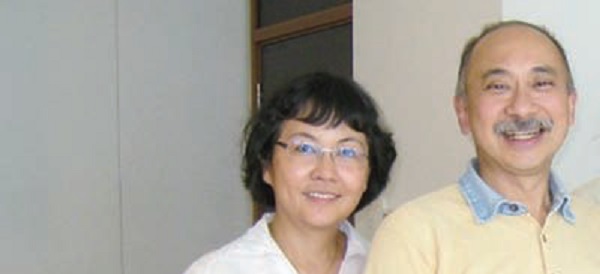Be neighbors with the sad

Seeing the exhausted and desperate faces who had survived the disaster, they embarked on a new journey without hesitation...
With their unique elegance, deep classical guitar music, and sweet singing, they quietly came to our church. No one knew that they were Luo Jiajun and Su Xiyuan. They had fought for decades and traveled to five continents. Missionaries, no one expected that their rest days would be so short after they were relieved of missionary duties.
Eight years ago, on an ocean-going cargo ship docked near the Port of Seattle, port staff discovered dozens of Chinese compatriots who had smuggled themselves across the mainland from the dark, narrow and suffocating containers, as well as three people who had died in the bumpy shipping. A corpse. The distraught survivors were immediately detained in the local immigration detention center.
When Mr. and Mrs. Locke saw the exhausted and desperate faces on TV, they felt as if they heard the last words of the Lord Jesus on the cross, "I thirst!" before he died, and were called to follow the Lord back then. Just like setting off on an expedition, I embarked on a new journey without hesitation.
Embrace the desperate heart
Inspired by them, brothers and sisters from different churches prepared sumptuous delicacies and sent them to the detention center on New Year's Eve. The incarcerated compatriots ate a feast of love while listening to the touching hymns, and they were all moved. The sincere love of Mr. and Mrs. Luo Jiajun quickly won the trust and love of their compatriots, who affectionately called them Brother Luo and Sister Luo. The gospel ministry of the Immigration Bureau began under the coordination of the local World Relief.
Since then, every Sunday night, Brother Luo and Sister Luo led the volunteers to arrive at the Immigration Bureau Detention Center on time to visit and express condolences. For eight winters and summers, spring and autumn, they never stopped. The visit is divided into two sessions for men and women. When there are many people, the visit is divided into three sessions, each session is about one hour. On weekend nights, compatriots would lie on the windows of the detention center, eagerly awaiting their arrival, looking forward to hearing the beautiful chord-guitar-accompanied singing and learning more fresh and touching poems.
The words they shared every week, their sincere prayers for each person, the strong hugs on their shoulders, and the beautiful and melodious poems alleviated the sadness, sorrow and despair of the prisoners, and brought joy and hope to those who were away from home and in distress. Many of them accepted Jesus and began to read the Bible and pray.
Half a year later, the cases of our compatriots began to bear fruit. Some were successfully released, some were paroled due to illness, some were sent back to the country, and some were continued to be detained pending trial. Those who were released or paroled had no relatives as soon as they left the gate of the Immigration Bureau. The first people they came to seek refuge with were Brother Luo and Sister Luo. For several years, their home became an inn with food and lodging included. The compatriots who were released in batches were all taken to their homes and stayed there for ten days and a half. They have long been accustomed to reception work, and pick-up and drop-off at the airport are even more commonplace.

▲The couple Luo Jiajun and Su Xiyuan saw that wherever there was a sad heart, there were their neighbors.
Close to the mourning spirit
The agency they had worked for many years decided to relocate to another state after adjustments. They did not hesitate and decided to stay and continue the gospel ministry of the Immigration Bureau. Later, the Immigration Bureau moved to another city dozens of miles away, but it still did not hesitate. After selling the house, it moved into a cheap and simple house close to the new Immigration Bureau detention center and continued its visit and reception work.
Locke and his wife not only keep in touch with their compatriots who are scattered across the United States after being released or paroled, but also make a special trip to visit them whenever they have the opportunity to help them get in touch with the local church. He never forgets those who were repatriated, and visits the mainland regularly every year, so that those brothers and sisters who were repatriated, weak physically and mentally, and struggling to survive can once again feel the care and encouragement. As for some of them who immigrated to Europe and Central and South America, they even specially invited Brother Luo and Sister Luo to meet them.
Not long ago, I had the opportunity to have a casual meal with them before they were invited to attend a conference called "Chinese Restaurant Evangelism" in north-central England. During the dinner, their cell phones rang and they received a call from Texas, thousands of miles away, asking them to buy a pair of shoes for a compatriot who was about to be deported to the country. Sister Luo calmly wrote down the size of the shoes, the name and address of the recipient, then turned off her phone and continued eating and talking with laughter. When I was leaving in the evening, I met a homeless man in an empty parking lot. Brother Luo had already left the parking lot, turned around and drove back, handing him a newly packed lunch box and two oranges.
Their ministry is so simple and down-to-earth, serving wherever they go. Where there is a broken heart, there is a neighbor. They transcend race, culture, and tradition; they transcend churches, communities, and national boundaries; they devote themselves fully to the kingdom of God because the Lord once said:
“But inasmuch as you have done it to one of the least of these my brothers, you have done it to me.” (Matthew 25:40)
 Author profile
Author profile
Zhang Quan, after graduating from the English Department of Beijing International Studies University, received a master's degree in American Literature from Keele University in the UK. He received his PhD in American Studies from the University of Maryland in 1993. Currently working at the University of Washington, USA.
